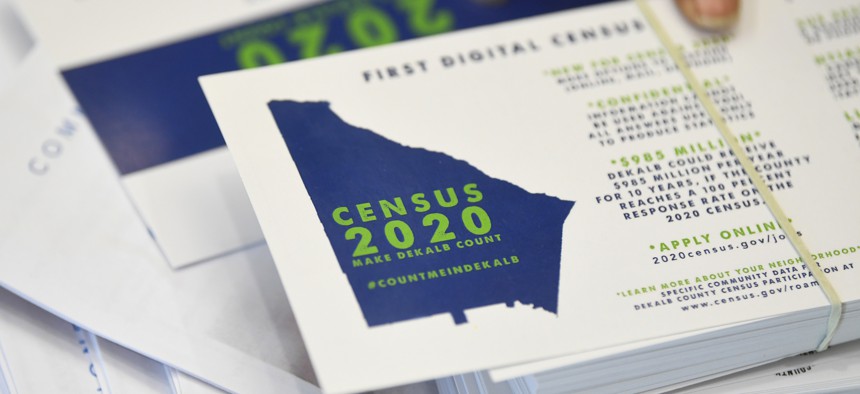From School Outreach to Hip Hop: How Mayors Plan to Boost Census Participation

In this Aug. 13, 2019, file photo a worker gets ready to pass out instructions in how fill out the 2020 census during a town hall meeting in Lithonia, Ga. AP Photo/John Amis
The 2020 Census count will begin nationally in March and mayors are working to get the message out that every resident needs to be counted.
When the 2020 Census count kicks off later this year, the mayors of Atlanta and Houston plan to wager on which city will have a better overall response rate.
A prize, other than bragging rights, is yet to be determined, said the two mayors, who spoke about the census at the U.S. Conference of Mayors on Thursday.
But with the ability to track census form response rates in real time, it’s the type of messaging they encouraged other city leaders to consider as a way to boost awareness about the decennial count.
Beginning in March, the Census Bureau will upload daily response rate data from each census tract to its Response Outreach Area Mapper, said Burton Reist, a spokesman for the agency. The data can be used to target neighborhoods or communities with low response rates with extra outreach efforts.
To engage a diverse set of residents, state and local leaders need to come up with diverse approaches that will allow them to reach those communities, mayors said at Thursday’s Census panel.
“What we’ve done is try not to think about it as a government messaging format, but what makes sense to our community,” said Atlanta Mayor Keisha Lance Bottoms.
That has meant partnering with artists in Atlanta’s hip hop community as a way to spread awareness.
In Houston, officials have ramped up communication strategies through schools and city services to reach residents, said Mayor Sylvester Turner. Unlike many other states, Texas is not providing financial support to help facilitate the census count.
The 2020 Census will be crucial in determining how hundreds of billions of federal dollars are divided among states and localities in the years ahead for programs that help provide money for highway construction, food stamps and health care for the elderly and the poor. Census data provide the bedrock on which formulas are based for distributing certain federal funds.
An undercount of just 1% of the population could have dramatic implications for state coffers. About 300 federal programs rely on census data to make decisions about the allocation of more than $800 billion a year in funds.
Some mayors worried that mistrust of the federal government among immigrant communities will make it more difficult than in prior years to count residents. Although a question about citizenship will not be included on the 2020 Census, mayors said they still encounter hesitance by community members to participate.
In those instances, local governments could have the most well-crafted messaging about the importance of completing census forms, but residents will not believe the message if it is not delivered by a trusted community member, said James Diossa, mayor of Central Falls, Rhode Island.
To dispel myths about the census, he believes the best approach is to have influential, well-known community members knock on doors to talk to residents about how census data is and is not used.
Vanita Gupta, the president of the Leadership Conference on Civil and Human Rights, encouraged state and local governments to utilize such “trusted messengers” to explain to residents how census data is safeguarded. Data collected by the bureau can only be used for statistical purposes and the bureau is barred from releasing any identifiable information about respondents to anyone, including law enforcement.
“The only way to overcome it is to repeat, repeat, repeat and then let people know what the infrastructure is to safeguard the census,” Gupta said.
Andrea Noble is a staff correspondent with Route Fifty.
NEXT STORY: Law Enforcement Will Have a Harder Time Seizing Property In This State





